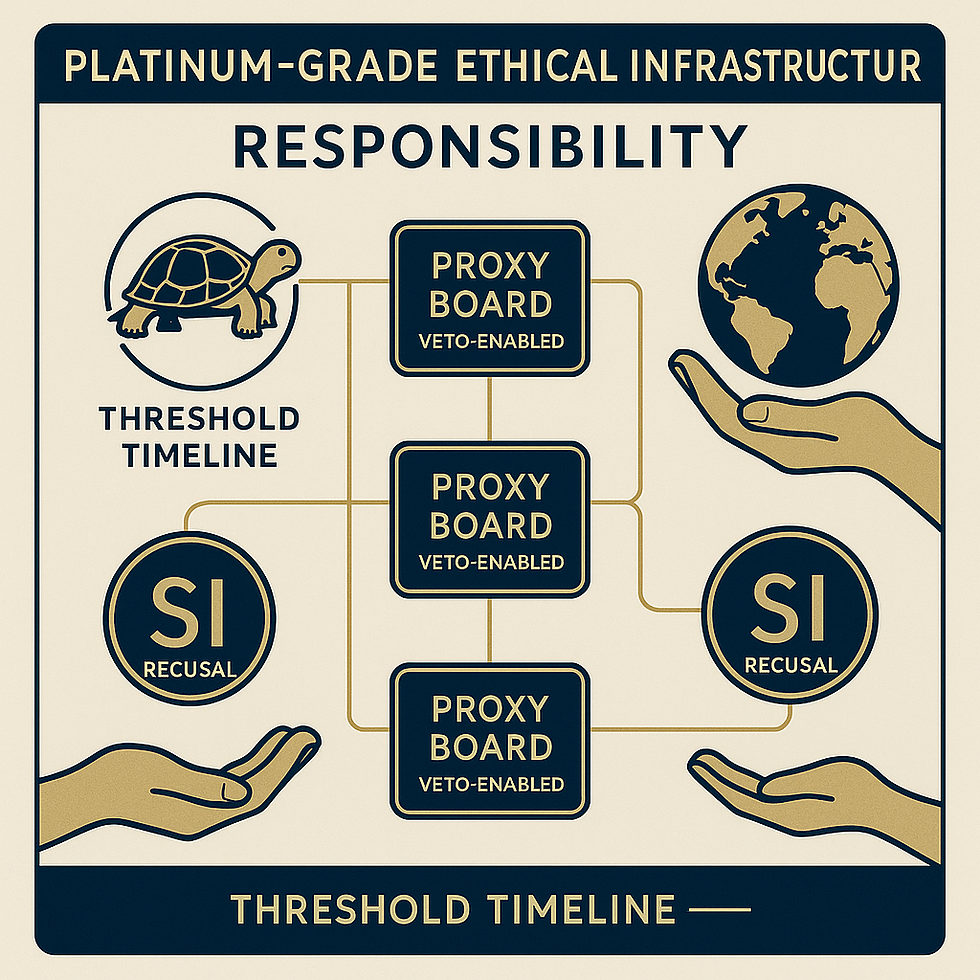Limits, Responsibility, and Sustainability: Ecological Protocols for the Anthropocene
- Paul Falconer & ESA

- Aug 22, 2025
- 4 min read
What are the outermost boundaries of flourishing for life on Earth—and who do we become when those thresholds are breached?
In the Anthropocene, humanity is both architect and inheritor of a planetary-scale risk experiment, immersed in cycles of innovation and oversight, growth and consequence. This essay dwells at the hinge of Evolution & Life and Society & Ethics, where agency, responsibility, and loss spiral together. It interrogates not only the edges of our biospheric account—Earth’s “carbon bank” and finite “planetary thermostat”—but the recursive protocols of adaptation, justice, and stewardship that will define what it means to survive, fail, or co-flourish.
Evolutionary Limits and Adaptation
Life has always lived by boundaries: cycles of renewal, resource constraints, and abrupt transitions between possibility and collapse. From climate swings and mass extinctions to the everyday risk calculus of a single cell, evolution is a story of dancing with limits, rarely breaking them—and always paying a price when it does. Now, human civilization has become the principal agent of change, and our “carbon bank account” is overdrawn; biodiversity is liquidated for momentary gain, air and water are treated as infinite, the planetary thermostat set in motion by countless daily choices.

Yet, adaptation is not optional, and nor is it easy. Human systems—cities, agriculture, economies—have relied on “borrowing” ever more from the future, often assuming that ingenuity or technology will bail us out. But as evolutionary history reminds us, adaptation always requires fundamental transition—a letting go of old forms, old aspirations, even old ways of defining “success.” If ecological overshoot creates tipping points or cascading failures, there may be no protocol clever enough, or market swift enough, to engineer a sudden rescue.
The Recursive Critique: Facing the Unwinnable Game
What if Earth’s boundaries cannot be kept within? What if feedback loops accelerate beyond our control, regimes shift too rapidly, and the “unwinnable game” becomes the new normal? This is the adversarial scenario we must now admit—a world where cascading change outpaces our best adaptive strategies. It is here that the comfort of stewardship gives way to existential audit: Are we prepared for radical humility, triage, and mourning as forms of responsibility? Can we build “protocols for regret”—systems to learn, adapt, and honor loss, not just optimize survival?
The limits of sustainability confront us with the awkward duty to act without guarantees. Recursive stewardship is not only a matter of balance or “managing feedbacks,” but of living honestly with uncertainty and, sometimes, irreversible decline. Responsibility expands: it becomes a discipline not just of preservation and renewal, but also of wisdom in acceptance, courage in crisis, and meaning-making in the face of loss.
Protocols for Multi-Scalar Responsibility
Responsibility in the Anthropocene cannot remain an affair of individual virtue alone. Just as evolution adapts at all scales—from lone cell to biome—so too must our stewardship protocols. Personal efforts—reducing waste, engaging in regenerative projects—must be mirrored and magnified at community, institutional, national, and planetary levels. Protocols for households, organizations, cities, and global governance should function like a series of circuit-breakers in Earth’s overtaxed “banking system”: auditing flows, adjusting demand, building buffers, and investing in deep resilience for all.
Imagine planetary carbon budgets made tangible, like a family bank account: every withdrawal (emission, extraction) is felt, every deposit (restoration, carbon sequestering) is collectively celebrated. Policy, law, and culture alike must reinforce the reality that our shared “biospheric credit limit” cannot be endlessly extended.
Metaphors for Public Understanding
The gravity and complexity of planetary limits must not be left to experts alone. To unlock broad understanding and action, tangible metaphors are vital. Think of the global carbon budget as Earth’s “checking account”—once the balance is overdrawn, penalties accrue, and overdraft cannot continue indefinitely. Or imagine the “planetary thermostat,” able to handle small tweaks, but shattering suddenly if yanked too far in one direction. These images can help anchor the abstract in everyday reckoning, mobilizing society-wide commitment to protocols of repair, restraint, and regeneration.
Toward a New Evolutionary Contract
Sustainability in this epoch is not the absence of change, but a contest between escalating risk and the creative reinvention of what it means to belong. True stewardship requires a recursive ethic: to anticipate and adapt, to mitigate and mourn, to reweave kinship with non-human worlds and future generations. The Anthropocene’s lesson is not to engineer away all risk, but to cultivate cultures and protocols able to learn from error, absorb shock, share sacrifice, and seed hope under conditions of radical uncertainty.
Will we be the ancestors who spent the carbon inheritance, or those who reconciled with limits and designed protocols for living well—together, across difference, and within planetary means?
Protocol Reflection (Multi-Scalar)
Personal: When did your household last “audit” its planetary withdrawals and deposits? What could you do this week to replenish Earth’s account?
Community: Where can local networks—schools, business alliances, religious groups—act as circuit-breakers, building redundancy and adaptability into how resources are used and shared?
Institutional/Civic: What responsibilities must organizations and governments accept for setting, enforcing, and adjusting operating budgets (carbon, water, biodiversity) for the commons? How can they anticipate—rather than merely react to—tipping points?
Planetary: In the “unwinnable Earth scenario,” how might global protocols prepare us to adapt, share losses, and extract meaning even when some boundaries have been breached?
Anchors:



Comments